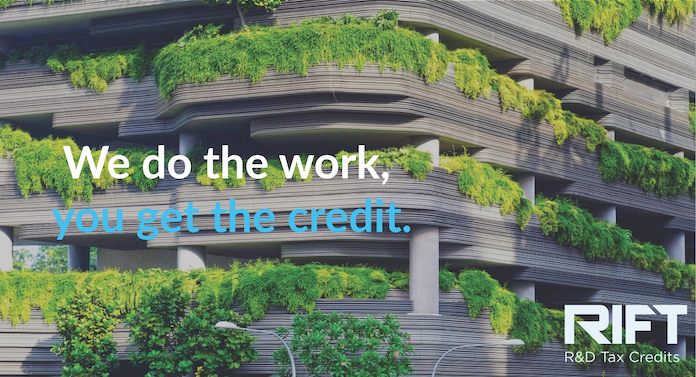
The deadlines set by climate change are driving a revolution in sustainable construction innovation, says R&D tax credit expert RIFT
With 2030 presenting a hard deadline for mitigating the worst, most irreversible effects of global climate change, the clock is most definitely ticking. Within the next decade, according to a report from the UN Intergovernmental Panel on Climate Change, we need to drop our carbon emissions by half on a planetary scale. In fact, in real terms, the cliff edge we’re approaching may be a lot closer than we realise.
Given that the UK’s built environment is responsible for an estimated 45% of the country’s total carbon emissions on its own, it makes sense to focus a significant amount of attention, investment and innovation there. Building efficiency is becoming an increasingly high priority throughout the construction sector, and rightly so. Innovation has always been a crucial factor in energy efficiency and sustainable ‘green’ construction, and with pressure mounting and the world paying attention, there’s never been a more critical moment to push back
the boundaries of what we can accomplish in the sector.
Sustainable construction techniques tick all the boxes for bringing carbon emissions down and improving energy efficiency. We’re talking about more than just good insulation and the occasional solar panel here, of course. Across the entire industry, innovative businesses are switching to more sustainable materials, finding better ways to transport them and reducing the waste they generate. The resulting buildings are becoming more efficient to put together and power – and less expensive to live or work in. Along the way, we’re learning to do more with our existing resources and manpower, while technologies from machine learning to augmented reality are expanding what it actually means to work in construction. Older processes and techniques are falling away, while workers are building new skill sets to adapt and progress.
As the world drags itself out of a pandemic-induced lockdown, it’s essential that we continue leaning into sustainable, energy-efficient construction to avoid an explosion in carbon output that takes the 2030 carbon reduction target permanently off the table.
Innovation, through the forward-thinking nature and determination of upcoming construction managers, is the force driving these changes – whether that means new forms of glass that filter harmful solar radiation while harvesting energy or using modular and offsite construction techniques to reduce construction times and increase cost-effectiveness. As an aggressively innovative industry, construction managers have a key role to play in the global ‘green recovery’ that we need to meet our 2030 commitments.
Climate change is a threat that’s arguably more pressing and all-encompassing than anything else we’ve faced, and the green revolution taking place within construction is right at the cutting edge of our attempts to tackle it. That’s why innovation matters – and why RIFT continues to fight to bring its full benefits to UK businesses.
To find out how you can make the most of the R&D scheme, visit RIFTcredits.com or contact Julie Barry on 07908 542441 or by email at [email protected].









